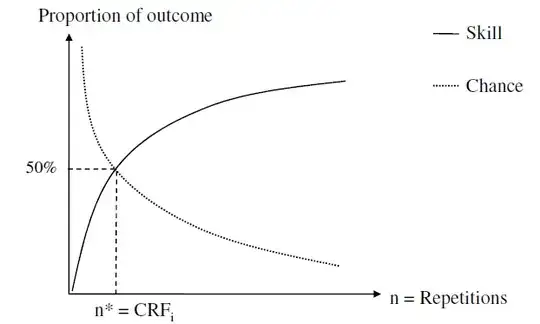I think the "more" part of the (title) question is difficult to answer. You need a metric for "more".
Several papers have used the metric proposed in "On a relative measure of skill for games with chance elements": a scale of 0 to 1 for the skill element, calculated as
skill = (potential learning effect) / (potential learning effect + random effect)
For a single-player game, this comes down to:
skill = (Gm - G0) / (Gu - G0)
where the G's are the expected net gains of three players
'0': a beginner who plays the game in the naive way of somebody who has
just mastered the rules of the game.
'm': a real average player who can be thought to represent the vast majority
of players.
'u': a virtual average player whom we tell in advance (i.e. before he has
to decide) the outcome of the chance elements.
As examples, they give for American Roulette Gu = 35 and Gm = -1/74 and G0 is -1/37 assuming the beginner won't play a simple strategy, which gives a skill of 0.0004. If the beginner does play a simple strategy like just red/black, then the skill is 0 (there's nothing more to be learned about Roulette than that). Using computer simulation, for Blackjack they determined Gm = 0.11, Gu = 27, and take G0 = -0.057 for a "mimic the dealer" beginner strategy, which gives a skill of 0.002.
Unfortunately, this metric is difficult to calculate for more interesting games, like any full-fledged poker variant. Several papers have calculated this skill value for simplified versions of poker.
The papers emphasise however that the exact skill value depends on the definition/assumption of beginners’ behavior.
Another way to tackle this problem is experimentally as in the accepted answer, but do note that the NBER paper discussed there is using a proxies for skill past winning and measures derived from that (like rankings), so it is measuring more of an autocorrelation (past winnings predicting present ones). What's more important (see figure 1 in that paper) is that the cash structure of the tournament is highly convex, so won 30% more money doesn't really mean would win 30% more games.
So, a slightly older paper has results I think are worth mentioning.
"Quantifying Skill in Games—Theory and Empirical Evidence for Poker" analyzed two on-line Poker sites' data and came up with this summary:

The median winrate in that table is an absolute value and expressed in BBs (big blinds) adjusted for rake, so that the numbers are comparable across different-BB (stake) groups. The sigma is the standard deviation of that winrate with the odd twist that they say the could not compute it except for the last group, so that's why the entire column has the same value. The two CRFs are calculated simply as 4sigma/winrate^2 and respectively 9sigma/winrate^2. The theoretical interpretation of the CRF is the number of games it would take for a player to reach his 50%/50% chance-vs-skill cut-off point, illustrated below

From the table, it's obvious that whom one is playing against makes a big difference in winrate and thus CRF. Absolute winrate goes down pretty fast (and CRF goes up) with the experience group because the big losers go away quickly. So rather than having a theoretical discussion as to the beginner's behavior, now one has to decide how clueless of a player one allows into the sample. The authors note that playing 1,000 hands may seem like a big number, but can be reached in 13 hours of online play (and about 33 hours in a brick-and-mortar casino).

